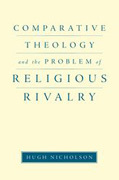
A model of interreligious theology that seeks to reconcile the ideal of religious tolerance with an acknowledgement of the extent to which religious communities construct identity on the basis of religious differences. In theological discourse, argues Hugh Nicholson, the political goes "all the way down." Onenever reaches a bedrock level of politically neutral religious facts, becauseall theological discourse - even the most sublime, edifying, and "spiritual"--is shot through with polemical elements.Liberal theologies, from the Christian fulfillment theology of the nineteenthcentury to the pluralist theology of the twentieth, have assumed that religious writings attain spiritual truth and sublimity despite any polemical elements they might contain. Through his analysis and comparison of the Christian mystical theologian Meister Eckhart and his Hindu counterpart aSkara, Nicholson arrives at a very different conclusion. Polemical elements may in fact constitute the creativesource of the expressive power of religious discourses. Wayne Proudfoot has argued that mystical discourses embody a set of rules that repel any determinate understanding of the ineffable object or experience they purport to describe. In Comparative Theology and the Problem of Religious Rivalry, Nicholson suggeststhat this principle of negation is connected, perhaps through a process of abstraction and sublimation, with the need to distinguish oneself from one's intra- and/or inter-religious adversaries.Nicholson proposes a new model of comparative theology that recognizes and confronts one of the most urgent cultural and political issues of our time: namely, the "return of the political" in the form of anti-secular and fundamentalist movements around the world. This model acknowledges the ineradicable natureof an oppositional dimension of religious discourse, while honoring and even advancing the liberal project of curtailing intolerance and prejudice in the sphere of religion. IntroductionPart I: Theology and the Political1. The Reunification of Theology and Comparison in the New Comparative Theology2. The Modern Quest to Depoliticize Theology3. From Apologetics to Comparison: Towards a Dialectical Model of Comparative TheologyPart II: Mysticism East and West Revisited4. Mysticism East and West as Christian Apologetic5. God and the God beyond God in Eckhart and aSkara6. From Acosmism to Dialectic: aSkara and Eckhart on the Ontological Status of the Phenomenal World7. Liberative Knowledge as ''Living without a Why''Conclusion
- ISBN: 978-0-19-977286-5
- Editorial: Oxford University
- Encuadernacion: Cartoné
- Páginas: 344
- Fecha Publicación: 25/08/2011
- Nº Volúmenes: 1
- Idioma: Inglés
